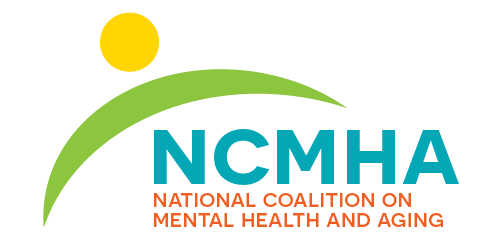
WHY WE SHOULD ALL CARE ABOUT OLDER ADULT MENTAL HEALTH & SUBSTANCE USE—AND WHAT WE CAN DO ABOUT IT
NCMHA believes in a just society that values and supports people of all ages equally. The aging of the U.S. population presents an unprecedented opportunity for societal growth. Enhancing the mental and behavioral health of older people maximizes the well-being and contributions of all of us as we age. For many older adults, later life is a time of enhanced resilience and emotional well-being. Yet, we have a long way to go in equipping our service delivery systems to support the mental and behavioral health of older people:

An Aging America
The number of people 65 years and older will almost double between 2010 and 2030, from 40.3 million to 72.1 million. (1)

High Prevalence of Mental Health and Substance Use Disorders
One in four older adults live with a mental health or substance use disorder. (2) Depression is the most common mental illness experienced by older adults. (3) Use of illegal and recreational drugs by older adults is increasing, as is problematic opioid use. (4)

Disproportionate Impact of Suicide
Older white men have the highest suicide rate of any age group. (5)

Impact of Mental Illness on Physical Health
Mental illness increases poor outcomes and mortality for common conditions such as heart disease, cancer, hip fractures, and diabetes. (6) Medicare spending on necessary care for beneficiaries with mental illness is two to three times higher than spending for other Medicare beneficiaries. (7)

Shortened Life Span
Serious mental illness reduces life expectancy by 11 to 30 years, largely due to increased comorbid conditions such as heart disease. (8)

Inadequate Access to Appropriate Treatment
Only 4% to 28% of older adults with mental health and substance use disorders receive mental health and substance use services. (9)

Racial and Ethnic Disparities in Access to Care
Black and Latino older adults have less access to affordable, culturally competent mental health services than do their white peers. (10)

Impact of the COVID-19 Pandemic
Almost half of older adults have reported that COVID-19-related worry and stress has had a negative impact on their mental health; older people have also been disproportionately affected by loneliness, social isolation, and bereavement as a result of the pandemic. (11)
Fortunately, we know which policy changes and evidence-based practices work for older adults:
- Health promotion programs to prevent late-life mental health disorders
- Integrating mental health care and physical health services
- Home and community-based mental health outreach services
- Mental health self-management programs as part of overall wellness strategies
- Screening, Brief Intervention, and Referral to Treatment (SBIRT) for Substance Use
Increasing access to all licensed mental health providers in the Medicare program - Support for family caregivers of people living with dementia
By working together, we can support the mental and behavioral health of older Americans and create a more just society for all of us as we age. Learn more about NCMHA’s work and consider joining us.
NOTES
1. https://transgenerational.org/aging/demographics.htm
https://www.aarp.org/livable-communities/info-2014/livable-communities-facts-and-figures.html
2. Kaiser Family Foundation. One in Four Older Adults Report Anxiety or Depression Amid the COVID-19 Pandemic. 2020. https://www.kff.org/medicare/issue-brief/one-in-four-older-adults-report-anxiety-or-depression-amid-the-covid-19-pandemic/
3. https://nap.nationalacademies.org/catalog/13400/the-mental-health-and-substance-use-workforce-for-older-adults
4. Problematic Opioid Use Among Older Adults: Epidemiology, Adverse Outcomes and Treatment Considerations, Drugs Aging. 2021; 38(12): 1043–1053.
Published online 2021 Sep 7. doi: 10.1007/s40266-021-00893-z
https://www.ncbi.nlm.nih.gov/pmc/articles/PMC8421190/
5. Centers for Disease Control and Prevention (CDC) – Disparities in Suicide.
https://www.cdc.gov/suicide/facts/disparities-in-suicide.html#:~:text=Men%20aged%2075%20and%20older,group%20(47.8%20per%20100%2C000)
6. DeHert, M., et al, “Physical illness in patients with severe mental disorders. I. Prevalence, impact of medications and disparities in health care,” World Psychiatry. 2011 Feb; 10(1): 52–77. — doi: 10.1002/j.2051-5545.2011.tb00014.x
https://www.ncbi.nlm.nih.gov/pmc/articles/PMC3048500/
7. Figueroa, JF, et al, “Association of Mental Health Disorders with Health Care Spending in the Medicare Population”, JAMA Network Open. 2020;3(3):e201210. doi:10.1001/jamanetworkopen.2020.1210
https://jamanetwork.com/journals/jamanetworkopen/fullarticle/2762948
8. DeMooij, LD, “Dying Too Soon: Excess Mortality in Severe Mental Illness, ORIGINAL RESEARCH article Front. Psychiatry, 06 December 2019 Sec. Public Mental Health,
https://doi.org/10.3389/fpsyt.2019.00855
https://www.frontiersin.org/articles/10.3389/fpsyt.2019.00855/full
9. https://www.apa.org/pi/about/newsletter/2018/06/older-adult-mental-health
10. The Commonwealth Fund. Mental Health Experiences of Older Black and Latinx Adults in the U.S. Health System, July 21, 2022. https://www.commonwealthfund.org/blog/2022/mental-health-experiences-older-black-and-latinx-adults-us-health-system
11. Kaiser Family Foundation. One in Four Older Adults Report Anxiety or Depression Amid the COVID-19 Pandemic. 2020. https://www.kff.org/medicare/issue-brief/one-in-four-older-adults-report-anxiety-or-depression-amid-the-covid-19-pandemic/
Icons made by https://www.flaticon.com/authors/kiranshastry Flaticon www.flaticon.com is licensed by Creative Commons 3.0.
